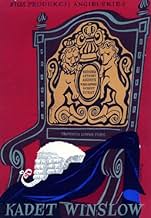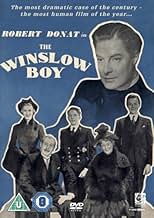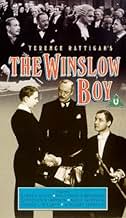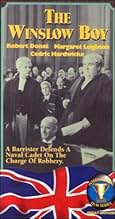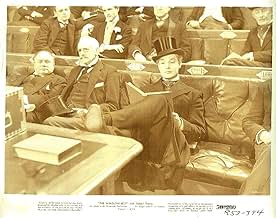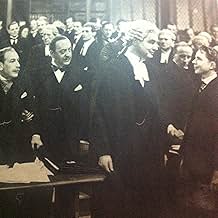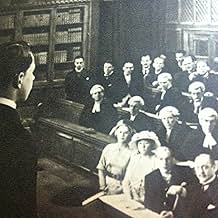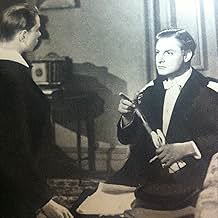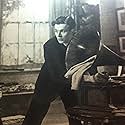VALUTAZIONE IMDb
7,6/10
1998
LA TUA VALUTAZIONE
Aggiungi una trama nella tua linguaIn pre-WWI England, a youngster is expelled from a naval academy over a petty theft, and his parents raise a political furor by demanding a trial.In pre-WWI England, a youngster is expelled from a naval academy over a petty theft, and his parents raise a political furor by demanding a trial.In pre-WWI England, a youngster is expelled from a naval academy over a petty theft, and his parents raise a political furor by demanding a trial.
- Regia
- Sceneggiatura
- Star
- Nominato ai 1 BAFTA Award
- 1 vittoria e 2 candidature totali
Cedric Hardwicke
- Arthur Winslow
- (as Sir Cedric Hardwicke)
Recensioni in evidenza
This is one of the greatest movies I have ever seen, and since I turn 92 next month, I have seen a fair number of movies. Robert Donat, one of England's greatest actors ever, embodies the true-life soul of Sir Robert Morton, a high-powered attorney, who sacrificed his success for principle. Sir Cedric Hardwicke as magnificent as the accused boy's beleaguered father. Margaret Leighton's chemistry with Donat is flawless. The dialogue by Terrence Rattigan is equally classic. There are also wonderful small bits by Stanley Holloway, Cyril Ritchard, and Ernest Thesinger. If you wish to see a classic English film, almost unknown in this country, rent this one, and you are in for a treat.
Incidentally, there is also a 1998 version of this movie starring Jeremy Northam and Ian McKellen. Although it does not approach the greatness of the original, it is a more than satisfactory homage, and well worth seeing in its own right --- AFTER you've treated yourself to Donat's classic performance.
Incidentally, there is also a 1998 version of this movie starring Jeremy Northam and Ian McKellen. Although it does not approach the greatness of the original, it is a more than satisfactory homage, and well worth seeing in its own right --- AFTER you've treated yourself to Donat's classic performance.
This is my second favorite movie of all time, after A Man For All Seasons. Both are spectacular to me because they embrace, discuss, and analyze philosophies and ideals. Both are also spectacular because of once-in-a-lifetime leading man performances. Scofield, quite justly, won Best Actor of 1966. I think he his portrayal was the Best of the 20th Century -- but I digress.
Donat is equally eloquent, compelling, and vulnerable as Sir Robert Morton. Donat is, in my opinion, one of the best 10 actors ever, and has a screen presence, and an embedded sense of irony, few have ever equalled. Sir Cedric Hardwicke and Margaret Leighton are absolutely superb in their roles as well. And there is a marvelous dance hall cameo from Cyril Ritchard and Stanley Holloway.
The brittle exterior of Sir Robert belies a passionate and sensitive lover of the law. Many times actors have essayed crusty characters trying to hide their hearts of gold, this portrayal goes so infinitely beyond that it makes all others look like pale imitators.
This is a movie that demands to be seen. The recent remake with Northam and Pidgeon was surprisingly good, but this one is pure greatness.
Donat is equally eloquent, compelling, and vulnerable as Sir Robert Morton. Donat is, in my opinion, one of the best 10 actors ever, and has a screen presence, and an embedded sense of irony, few have ever equalled. Sir Cedric Hardwicke and Margaret Leighton are absolutely superb in their roles as well. And there is a marvelous dance hall cameo from Cyril Ritchard and Stanley Holloway.
The brittle exterior of Sir Robert belies a passionate and sensitive lover of the law. Many times actors have essayed crusty characters trying to hide their hearts of gold, this portrayal goes so infinitely beyond that it makes all others look like pale imitators.
This is a movie that demands to be seen. The recent remake with Northam and Pidgeon was surprisingly good, but this one is pure greatness.
I hadn't seen this but was aware of its starry remake some fifty years on; having now seen both, this is the better movie for several reasons. Firstly, three brilliant actors in the cast: Cedric Hardwicke, who still fools me every time and it is a surprise and joy to discover it was him after all when the credits roll; Robert Donat, who had another definitive role in this to add to Mr Chips; and the lovely Margaret Leighton, as the suffragette Winslow daughter who isn't at all militant. Secondly, the plot, which manages to weave quite a few threads along with the central story of little Ronnie Winslow and the stolen postal order. And lastly, because of the sparkle and energy of the script and the detail put into every frame. It's a wonderful film which keeps the attention from wandering, and I highly recommend it.
Arthur Winslow is the head of a respectable London family; however this threatens to change when his young son is expelled from military school for stealing a postal order worth 5 shillings. Winslow risks his wealth and his family to pursue justice for his son. However when the military court of appeal rejects him he has to appeal to the highest court in the land through MP Sir Morton.
Having seen a recent version of this play I was curious to see another and was glad when I spotted it coming onto television. The play itself is pretty stagy and because of this it doesn't suffer from being dated the 1948 production values are easily the equal of the 1998 version. The film here differs from the recent version in that it has much more of the legal wrangling onscreen and not off. This makes the film much better as it encompasses both the social battle of the Winslow's and the legal one.
Both are involving and gripping but I must admit that I wasn't as caught up in the social drama as much as I wanted to be, because I felt that any family who's main worry in life was that there son had been excluded from school needn't worry about much! The fact that the Winslow's were able to get the ear of an MP just made it more difficult for me to get into few people live in such high circles (even if they work in a bank!).
The cast are good. Hardwicke is good as Winslow but the real star of the piece is Donat as Sir Morton. He is very stiff but also has layers that he reveals as he goes as well as carrying the weight of the legal thrills. The majority of the cast are good in roles of varying sizes and no-one does a noticeably bad job. Some are slight stereotypes but not to the film's detriment.
Overall this is a very good film and is better than the modern version. It mixes drama with wit and romance to good effect and puts the legal drama and the social drama on the same level rather than letting one suffer to the other. It had the potential to feel slow but the drama keeps it interesting throughout.
Having seen a recent version of this play I was curious to see another and was glad when I spotted it coming onto television. The play itself is pretty stagy and because of this it doesn't suffer from being dated the 1948 production values are easily the equal of the 1998 version. The film here differs from the recent version in that it has much more of the legal wrangling onscreen and not off. This makes the film much better as it encompasses both the social battle of the Winslow's and the legal one.
Both are involving and gripping but I must admit that I wasn't as caught up in the social drama as much as I wanted to be, because I felt that any family who's main worry in life was that there son had been excluded from school needn't worry about much! The fact that the Winslow's were able to get the ear of an MP just made it more difficult for me to get into few people live in such high circles (even if they work in a bank!).
The cast are good. Hardwicke is good as Winslow but the real star of the piece is Donat as Sir Morton. He is very stiff but also has layers that he reveals as he goes as well as carrying the weight of the legal thrills. The majority of the cast are good in roles of varying sizes and no-one does a noticeably bad job. Some are slight stereotypes but not to the film's detriment.
Overall this is a very good film and is better than the modern version. It mixes drama with wit and romance to good effect and puts the legal drama and the social drama on the same level rather than letting one suffer to the other. It had the potential to feel slow but the drama keeps it interesting throughout.
This film kept me in suspense not knowing what the outcome would be. The acting, period atmosphere and historical recreation are all outstanding. The Winslow Boy is directed by Anthony Asquith and has a stellar cast led by Cedric Hardwicke, Robert Donat, Margaret Leighton and others. The film evokes a period of time when honour, self-sacrifice and the heavy arm of authority ruled countries such as England in the name of the common good.
The setting is the Edwardian Era of early 20th century England and into this time and place, we find a youth who has been expelled from a naval academy for stealing. The family believes he is innocent and his recently-retired father, distant from his children, ageing and afflicted with arthritis, sees an opportunity to strike a blow for his youngest child against injustice. In jurisprudence, it is called let right be done.
In this heroic effort, Arthur Winslow the father, played by Cedric Hardwicke, is backed by the strong conviction of his daughter Kate (Margaret Leighton) and Sir Robert Morton who takes on the government of the day (Robert Donat).
Thirteen-year old Ronnie Winslow is expelled from his academy for theft. The evidence against him is real but the son is adamant that he is innocent. Arthur Winslow believes his son and takes the matter to his lawyer and eventually to the Cabinet. He is paid a visit by Robert Donat, as Sir Robert Morton, a Member of Parliament, who takes up the case.
One of the most hard-hitting scenes is a ruthless cross-examination. The boy maintains his innocence and the MP leaves their home convinced of the boy's innocence. The badgering is relentless and had me on the edge of my seat as Donat hurls one accusation after another at the boy, who does not bend during the ordeal.
Sir Robert takes a shine to Kate, Arthur Winslow's daughter, who is played by Margaret Leighton. She superbly performs the role and risks her engagement by pressing the MP to proceed with the case, which has now become a national sensation.
There is a dramatic showdown in the House of Commons and the First Lord of the Admiralty, egged on by Sir Robert, agrees to let the case go to court. The final outcome has added emotion as the senior Winslow, and Sir Robert are tired and ailing.
This is an excellent period piece as well as high drama with great acting by the leading players and those in supporting roles, particularly Kathleen Harrison, the housekeeper. The era is evoked with scenes taking place on golf courses and men's clubs where politicians discuss matters of state, not to mention the churches, concert halls and railway stations. The nation's affairs are dominated by the suffragettes and the Irish question. All-round great entertainment. Highly recommend.
The setting is the Edwardian Era of early 20th century England and into this time and place, we find a youth who has been expelled from a naval academy for stealing. The family believes he is innocent and his recently-retired father, distant from his children, ageing and afflicted with arthritis, sees an opportunity to strike a blow for his youngest child against injustice. In jurisprudence, it is called let right be done.
In this heroic effort, Arthur Winslow the father, played by Cedric Hardwicke, is backed by the strong conviction of his daughter Kate (Margaret Leighton) and Sir Robert Morton who takes on the government of the day (Robert Donat).
Thirteen-year old Ronnie Winslow is expelled from his academy for theft. The evidence against him is real but the son is adamant that he is innocent. Arthur Winslow believes his son and takes the matter to his lawyer and eventually to the Cabinet. He is paid a visit by Robert Donat, as Sir Robert Morton, a Member of Parliament, who takes up the case.
One of the most hard-hitting scenes is a ruthless cross-examination. The boy maintains his innocence and the MP leaves their home convinced of the boy's innocence. The badgering is relentless and had me on the edge of my seat as Donat hurls one accusation after another at the boy, who does not bend during the ordeal.
Sir Robert takes a shine to Kate, Arthur Winslow's daughter, who is played by Margaret Leighton. She superbly performs the role and risks her engagement by pressing the MP to proceed with the case, which has now become a national sensation.
There is a dramatic showdown in the House of Commons and the First Lord of the Admiralty, egged on by Sir Robert, agrees to let the case go to court. The final outcome has added emotion as the senior Winslow, and Sir Robert are tired and ailing.
This is an excellent period piece as well as high drama with great acting by the leading players and those in supporting roles, particularly Kathleen Harrison, the housekeeper. The era is evoked with scenes taking place on golf courses and men's clubs where politicians discuss matters of state, not to mention the churches, concert halls and railway stations. The nation's affairs are dominated by the suffragettes and the Irish question. All-round great entertainment. Highly recommend.
Lo sapevi?
- QuizThis film is based on the real-life Royal Navy cadet George Archer-Shee (1895-1914), the alleged theft took place in 1908 and the trial in 1910. Archer-Shee was commissioned in the British Army in 1913 and was killed in WWI at the First Battle of Ypres on October 31, 1914.
- BlooperWhen the film opens, a suburban train is coming into a station. The locomotive is in the livery of LNER (London & North Eastern Railway). Arthur Winslow alights having told his travelling companions that he has just retired from Lloyds Bank. When he gets home he shows his wife a pocket watch the bank gave him to mark his retirement. It's dated 1912, but the LNER wasn't created until 1923.
- Citazioni
Sir Robert Morton: I wept today because right had been done.
Catherine Winslow: Not justice?
Sir Robert Morton: No, not justice, right. It's easy to do justice, very hard to do right.
- ConnessioniVersion of The Winslow Boy (1958)
I più visti
Accedi per valutare e creare un elenco di titoli salvati per ottenere consigli personalizzati
- How long is The Winslow Boy?Powered by Alexa
Dettagli
- Data di uscita
- Paese di origine
- Lingua
- Celebre anche come
- The Winslow Boy
- Luoghi delle riprese
- London Film Studios, Shepperton, Surrey, Inghilterra, Regno Unito(studio: produced at London Film Studios Shepperton, England)
- Aziende produttrici
- Vedi altri crediti dell’azienda su IMDbPro
- Tempo di esecuzione1 ora 57 minuti
- Colore
- Proporzioni
- 1.37 : 1
Contribuisci a questa pagina
Suggerisci una modifica o aggiungi i contenuti mancanti

Divario superiore
By what name was Tutto mi accusa (1948) officially released in Canada in English?
Rispondi
